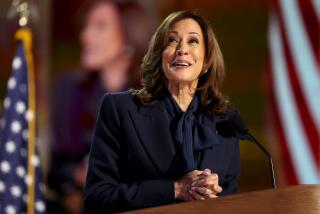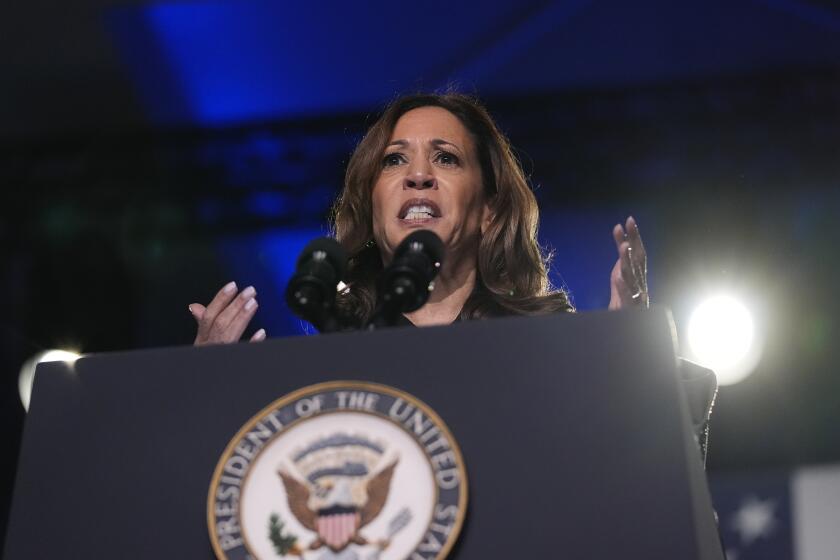Newsletter: Essential Politics: The political pulse races over healthcare
Political watchers know well the famous adage attributed to the late New York Gov. Mario Cuomo, that while “you campaign in poetry, you govern in prose.”
But what kind of prose could possibly capture the complexities of healthcare law? We’re about to find out — on the national level and here in California.
Good morning from the state capital. I’m Sacramento Bureau Chief John Myers, and this week is the first of many to come for debating the merits of just about everyone’s position on how to cure the many ailments of the nation’s healthcare delivery system.
But whatever you do, it seems, don’t call the plan unveiled by Republicans on Monday “Trumpcare.”
THE REPEAL AND REPLACE PLAN HITS THE STREETS
“We’re less concerned with labels right now and more in terms of action and results,” said Sean Spicer, the White House press secretary, when asked on Tuesday about the presidential moniker.
For his part, President Trump sounded supportive of the American Health Care Act, even as some in his administration sounded a bit more careful until reading the fine print.
And there’s a lot of it. The proposal was unveiled without any estimates of either its cost or how many Americans it would cover -- key points that lawmakers will ultimately hear a lot about from their constituents.
GOP leadership assured that they have the support they need.
“We can act now or we can keep fiddling around and squander this opportunity,” said Rep. Kevin Brady (R-Texas), chairman of the House Ways and Means Committee.
Others were less eager to climb aboard.
“This is not the Obamacare repeal bill we’ve been waiting for,” said Sen. Mike Lee (R-Utah).
Few, though, doubt the current proposal would reduce federal authority over the nation’s healthcare system.
Nor do they doubt it will have far-ranging repercussions here in California.
CALIFORNIA’S CHOICES UNDER THE NEW PLAN
“This plan passes the buck from the feds to the state,” said Lowell Brown, an advisor to health providers at the L.A. law firm Arent Fox.
No state embraced the many components of the Affordable Care Act more than California did, and thus no state will likely face as many challenges under what comes next.
As Soumya Karlamangla reports, millions of Californians could lose their coverage under the GOP proposal. The state’s version of Medicaid, Medi-Cal, grew to cover 3.7 million more people under the expansion offered by the federal law.
“We have the most to lose because we gained the most under the Affordable Care Act,” said Anthony Wright, executive director of the advocacy group Health Access California.
Gov. Jerry Brown, who was visiting a sheriff’s detention facility in Modesto on Tuesday as details started to emerge, conceded the obvious point to reporters.
“There’s a lot more questions than there are facts at this point,” he said.
NEW TRAVEL BAN KICKS IN ON MARCH 16
The healthcare overhaul may have masked, in some ways, the news on Monday of a revised travel ban ordered by the president.
Giving everyone a 10-day notice of its implementation, Trump’s administration unveiled a plan that scraps a ban on anyone holding a valid U.S. visa or green card as well as visitors from Iraq.
The ban, which takes effect March 16, halts travel for 90 days for residents of Iran, Libya, Somalia, Sudan, Syria and Yemen. The refugee suspension will last 120 days.
Critics insisted the revamped order still raises troubling legal questions, but the president’s team was resolute in its defense.
“Like every nation, the United States has a right to control who enters our country and to keep out those who would do us harm,” U.S. Atty. Gen. Jeff Sessions said during an announcement alongside Secretary of State Rex Tillerson and Homeland Security Secretary John Kelly.
GARCETTI POISED FOR FIVE MORE YEARS AS (SOME) GO TO THE POLLS
Tuesday was election day in Los Angeles, and the big winner was Mayor Eric Garcetti. Not only was the 46-year-old Democrat solidly on his way to a second term, this one will be longer than the last one.
Garcetti will get five years this time, as will those vying for seats on the City Council, as Los Angeles shifts away from its odd-year local elections.
Five years, of course, if he isn’t elected to another job. The high-profile mayor continues to be asked about a run for governor or some other position before his city term is up.
For complete coverage of Los Angeles County’s election day -- from measures on development and homeless help to City Council races, check out The Times’ local election news feed.
CALIFORNIA’S VOTING AGE: MAKE IT 17, SAYS LAWMAKER
Voter turnout in Los Angeles looked to be low on Tuesday, and a recent study suggested it’s those first voting experiences — or decisions to blow off casting a ballot — that stick with some people.
Some state legislators say they have the answer: Lower California’s voting age to 17.
The proposal was introduced on Tuesday. Assuming it’s approved by a supermajority vote in both houses of the Legislature, voters would have to ratify the constitutional amendment next year. California would be the only state in the nation with full voting rights — in primary and general elections — for voters under the age of 18.
A ‘HUDDLE’ INSTEAD OF A HORDE FOR VALADAO
Others have faced huge crowds and shouting matches back home, but one California Republican member of Congress took the temperature of his constituents one at a time.
Rep. David Valadao (R-Hanford) invited locals in for one-on-one meetings on Monday, 10 minutes per meeting.
Actually, he called the meetings a chance to “huddle” with folks back home. And he dismissed those who said he was hiding from residents angry over what they’ve seen from Trump and GOP leaders in Congress.
“We’ve had protesters, we’ve always had protesters, but our focus has always been to try to have a dialogue with our constituents,” said Valadao.
TODAY’S ESSENTIALS
-- Requests for legal advice at Mexico’s consulates in the United States have increased 400% amid fears of mass deportations, Mexican officials said Tuesday.
-- History was made at the State Department on Tuesday: the first press briefing of the Trump administration. And no, the secretary wasn’t there.
-- From the White House press briefing room on Tuesday, Spicer did something Tuesday he doesn’t often do: Correct the president. Sort of.
-- The man nominated to be the second-in-command at the Justice Department testified Tuesday that he was “not aware” of any reason he would be prohibited from overseeing investigations into Russia’s meddling in the U.S. presidential campaign.
-- Alarmed by his concerns over gun violence and the activity of “straw” firearms purchasers, a state senator has revived a proposal to limit Californians to buying no more than one gun a month.
-- California sheriffs opposed to high-profile legislation expanding sanctuary provisions for those in the U.S. illegally said this week it would prevent immigration officials from going after violent offenders.
-- California’s reservoirs are filled with gunk, writes George Skelton, and it’s crowding out room for water.
-- Anthony Beilenson, a former state legislator and congressman who championed environmental causes as well as abortion rights and gun control, died Sunday. He was 84.
LOGISTICS
You may have noticed we’ve shifted to a Monday, Wednesday and Friday schedule. It’s the same newsletter, just not every day. You can keep up with breaking news on our politics page throughout the day. And are you following us on Twitter at @latimespolitics?
Miss Monday’s newsletter? Here you go.
Please send thoughts, concerns and news tips to politics@latimes.com.
Did someone forward you this? Sign up here to get Essential Politics in your inbox.
More to Read
Get the L.A. Times Politics newsletter
Deeply reported insights into legislation, politics and policy from Sacramento, Washington and beyond. In your inbox three times per week.
You may occasionally receive promotional content from the Los Angeles Times.











